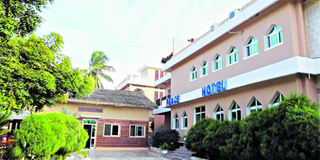Peace and war in Mogadishu

Preceded by a pick-up truck with four armed guards sitting on the back, we negotiated the zigzag of checkpoints and barricades of the short distance to the hotel. PHOTO| JOHN FOX
What you need to know:
- Hassan didn’t give me his usual security briefing because I had been through it before and I know my way around the hotel. But with a lot of pride he showed me the new displays in the operations room.
- On one wall there are the CCTV screens showing what is going on in the nearby streets.
Bashir calls his hotel in Mogadishu “Peace”. He might as well have called it “War”. Almost everything about it is designed to counteract the violence that too often goes on outside its blast-proof walls.
It was my first visit to the hotel since some of its outbuildings and houses along the road were destroyed in a massive explosion on the second day of this year. As usual, I was met and welcomed inside the airport by one of the Peace Hotel staff. This time it was young and smiling Mohamed. He took hold of my bags and walked me to the waiting armoured vehicle.
Preceded by a pick-up truck with four armed guards sitting on the back, we negotiated the zigzag of checkpoints and barricades of the short distance to the hotel. Once inside the heavy metal doors I was greeted by Hassan, who took me first to the operations room.
Hassan didn’t give me his usual security briefing because I had been through it before and I know my way around the hotel. But with a lot of pride he showed me the new displays in the operations room. On one wall there are the CCTV screens showing what is going on in the nearby streets. On another wall there is a massive interactive screen showing a Google map of the city covered in red dots like the chest of a youngster with measles.
The red dots are what Hassan calls “incidents”. When you click on a dot a text box appears telling you what the incident was: whether a suicide bomber’s attack, say, or a roadside mine, the details of the vehicle involved, any casualties, and the date it happened.
“What was that one?” I asked, pointing to a dot quite near the hotel. The text box told us that it was an IED – an improvised explosive device – that went off only a couple of weeks before and injured three people.
AVOIDING MAIN STREETS
Hassan explained that the streets coloured red were too dangerous to use.
“But let me show you the route we will take with you this afternoon to the ministry,” he said. He traced it with his finger, avoiding main streets as much as possible and, of course, the red ones.
Hassan took me over to the reception room where I was asked to fill in not only the usual card with name, address, passport number and so on, but also a form with more personal information – medical conditions, distinguishing marks, next of kin, and such – that is kept in a sealed envelope to be opened only if you get caught up in an “incident”.
Then I was taken to my bedroom in one of the cluster of villas that make up the accommodation facilities of Peace. I was pleased to see how it had been refurbished: with a very wide-ranging TV and, more important, bedside lights (I usually read myself to sleep, and I hate it when I have to get out of bed to turn off the light, especially if it means also having to untuck and re-tuck your mosquito net).
I had an hour in which to relax before being driven across the city. So I had a cappuccino and a banana in the café of the hotel’s tree-lined main courtyard – very much a peaceful oasis in a neighbourhood that seems always tense and frenetic.
FOLLOW PICK-UP
After that I was driven off in the same armoured vehicle, with doors so heavy I had to strain to open and close them. We sped through the dusty streets, again closely following in the tracks of the pick-up with the four gun-clutching guards. (I now better understand the joke that a woman in Somalia is now happy about the tradition of walking behind her husband – because he will be the one to tread on the mine).
I had my interview with the ministry Director General and I was driven back to Peace Hotel. The trip lasted less than three hours. I am too embarrassed to tell you what that secured drive and my over-night stay in Mogadishu cost, but I reckon that it would have been much cheaper to fly and meet the DG in Nairobi – and I am sure he would have enjoyed it more.
In the evening I had the barbeque dinner on the rooftop of one of the hotel’s villas. I was joined by Bashir, the hotel’s surprisingly young and understandably ebullient owner. We ate prawns cooked in a delicious sauce, listened to a selection of Bob Marley favourites, and chatted about what was going on down there under the city lights.
After an early breakfast, Mohamed accompanied me on the zigzag drive to the airport. Again, he guided me through the maze of checkpoints and the inspection by sniffer dogs. I tried to give Mohamed a tip. He refused it. The Peace Hotel in Mogadishu is a very efficient and special place.
John Fox is Managing Director of iDC





